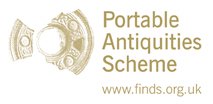Server check!
You are on the training database
The Treasure Act
COVID-19 Update - June 2020
The ongoing restrictions due to the COVID-19 pandemic have resulted in some changes to the process for finds reported under the Treasure Act 1996. Many people involved in the Treasure process have been off work; those in work have been doing so mostly remotely and avoiding unnecessary travel and minimising contact with others to avoid spreading the disease. This has meant longer than normal processing times for many cases, though measures have been put in place to progress cases where possible.
Normal practice is for objects or coins to be deposited with Finds Liaison Officers (FLOs) at the earliest opportunity in order for the FLO to write the required report for the Coroner. In some instances, face-to-face meetings are still not possible or are difficult to arrange, and the FLO, at their discretion, may write the report based on suitable images, whilst the objects themselves remain in the safekeeping of finders. Usually such finds will eventually have to be handed in when possible, and especially if declared Treasure and being acquired by a museum.
With respect to the valuation of finds which are to be acquired by museums, the usual practice has been for these to come to the British Museum to be inspected by experts in the trade and the Treasure Valuation Committee. Since November 2020 the Committee has, with the consent of interested parties, valued a number of cases 'remotely' (based on photographs). Whilst it is recognised that some significant and unusual items will need to be seen in person to be properly appreciated, the Committee may continue the practice of remote valuation beyond the period of the COVID crisis, to save common and straightforward finds from having to be transported to London. Interested parties will be kept informed of the valuation of their cases and given the opportunity to object to a remote valuation and request the item is seen in person.
The treasure process requires a significant amount of communication between authorities and interested parties. Especially at this time, the biggest thing that finders and landowners can do to assist in the timely processing of their case is to provide up-to-date email addresses.
The Treasure Act 1996
On these pages, you can find information about the Treasure Act and its administration. See the menus on the left-hand side of the page for more information.
In England, Wales and Northern Ireland, all finders of gold and silver objects, and groups of coins from the same finds, over 300 years old, have a legal obligation to report such items under the Treasure Act 1996. Prehistoric base-metal assemblages found after 1st January 2003 also qualify as Treasure. What is Treasure in the menu on the left provides more detailed information on the type of artefacts and coins which need to be reported as potential Treasure.
Finders of potential Treasure in England and Wales should contact their regional Finds Liaison Officers for help in reporting Treasure and for further advice. By law, finds of potential Treasure must be reported to the Coroner in whose district they were found within 14 days of discovery. Queries about Treasure finds from England should be directed to treasure@britishmuseum.org and queries about finds from Wales should be directed to treasure@museumwales.ac.uk.
More information on the operation of the Treasure Act and antiquities law in Northern Ireland or write to:
Department for Communities
Causeway Exchange
1-7 Bedford Street
Belfast
County Antrim
BT2 7EG
Tel: 028 9082 9000
The Treasure Act 1996 does not apply in Scotland or the Isle of Man, and the Portable Antiquities Scheme does not operate there.
The laws regarding Portable Antiquities in Scotland are very different than those in England and Wales. Whereas in England and Wales the recording of all non-Treasure finds is voluntary, all archaeological objects found in Scotland should be reported under Treasure Trove.
More information on the law in Scotland or write to:
Treasure Trove Unit
National Museums of Scotland
Chambers Street
Edinburgh
EH1 1JF
Tel: 0131 247 4355
Email: info@treasuretrovescotland.co.uk
The laws regarding Portable Antiquities in the Isle of Man are also very different. All archaeological objects found in the Isle of Man should be reported to the national heritage agency and no archaeological object may be exported from the Isle of Man without a licence.
For more information on the law in the Isle of Man please contact:
Manx National Heritage
Manx Museum
Kingswood Grove
Douglas
Isle of Man
Tel: 01624 648000
Email: enquiries@mnh.gov.im
Website: http://www.manxnationalheritage.im/
Wreck
Property found in the sea or the seashore could be from a ship and is known technically as 'wreck'. Wreck is not treasure. All wreck must be reported to the Receiver of Wreck. This can be done by downloading a form from the Receiver's website. The address of the Receiver of Wreck is:
The Maritime and Coastguard Agency
Bay 1/05,
Spring Place
105 Commercial Road
Southampton
Hampshire
S015 1EG
Tel: 02380 329474
Website: http://www.mcga.gov.uk



